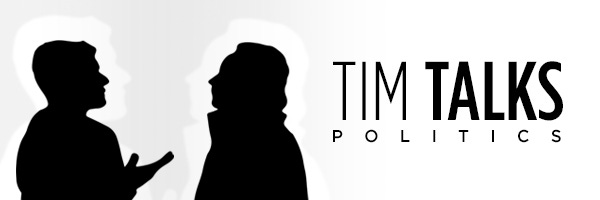Tim Talks Politics - The Weekly Brief, May 10, 2019

The Weekly Brief - May 10, 2019
“I see your sanctions and raise you…. A veiled threat?”
So, last we heard, America was putting new sanctions on Iran and refusing to renew oil waivers. That’s so last week.
Somehow, we’ve gone from hardball economic diplomacy to America dispatching a carrier group to the Persian Gulf, Iran stepping back from its JCPOA commitments and threatening Europe with a new wave of refugees (probably as a play to get the EU to push America to rethink its approach).

Apparently, Israel shared intelligence with the US on an as yet undisclosed Iranian threat, which prompted the movement of the carrier group. It might just be threats and counter threats as part of this “maximum pressure” diplomacy the Trump team seems to favor, but the Atlantic warns that this could very well lead to escalation.
Escalation to war? The American Conservative seems to think so. However, the Strategist notes that both Trump and Iran are making a similar play for time: 2020. For obvious, though differing, reasons, staying out of a war before the presidential election is probably in the best interest of both.
Despite the alarm bells ringing, the Hudson Institute takes a more counterintuitive approach and argues that Trump’s Middle East diplomacy is paying dividends.
If it quacks like a terrorist, is it a terrorist?
In one of the seemingly out of place episodes of Trump diplomacy in the last week, the President is urging the State Department to designate the Muslim Brotherhood as a terrorist organization. Al-Monitor reports this comes after a state visit by Egyptian President Sisi, himself no friend of the Brotherhood. However, Carnegie Endowment for International Peace argues that doing so would unnecessarily politicize the process and change the definition of terrorist organizations among other problems.
Not forgetting North Korea
Following up its missile test of last week with another test this week, North Korea seems to have returned to saber rattling as a diplomatic method of choice.
This time might be a little different, however, as America appears to have responded by seizing a North Korean merchant ship on charges of sanctions violations. It’s a publicized rebuke to North Korea’s apparent return to tantrum…. I mean, missile diplomacy, and one wonders what will get Kim Jong Un back to the negotiation table. The Strategist makes the case for security guarantees to North Korea as the missing piece.
Coming this summer….
Today marks the start of a new phase. No, not the next phase of the Marvel Cinematic Universe (that’s July), but the next phase of the China-America trade war. Hopefully it will be less explosive than your typical summer blockbuster. After trade talks broke down in the last week, Trump vowed to raise tariffs from 10% to 25% and those take effect today. Why the breakdown in talks? Perhaps unsurprisingly it seems the breakdown occurred mostly over technology-related issues.
So what now? Strategically, the Atlantic reports that if an agreement cannot be reached, then a fundamental rift will open in US-China relations. This would be a point where the two countries could move from strategic competitors to strategic adversaries. The stakes could not be higher, which is why War on the Rocks expresses concern over “problematic thinking” on China in the State Department. The American Conservative warns that a hawkish approach to China will turn it into an enemy neither party wants it to be.
Regardless of China remaining a competitor or becoming an adversary, the basic strategic concern remains: China’s influence in Europe and Eurasia, and the need for America to shore up its alliances. One region that could benefit from this great power struggle, however, is Southeast Asia.
Economic boom and gloom
Amid another excellent jobs report in April and continued growth in the American economy despite the renewed trade war with China, the National Review argues that Trump’s reelection bid is looking (for the moment) pretty good on the economic front. Why?
A large part of that argument is buttressed not just by the macro economic picture, but also by a recognition of where the job growth is happening. Brookings reports that formerly blue counties that flipped for Trump in 2016 are seeing the most growth, and the Daily Signal points out that the biggest gains in wage growth as a result of this have been the poorest Americans.
Outside the US, however, the economic picture is not as optimistic in some places. Australia is facing an economic downturn that threatens to turn into the first recession down under in 27 years.
Globally, Our World in Data reports that with poor economies starting to stagnate, the world’s poorest may not exit extreme poverty at the rate they have been. This is a trend to keep an eye on.
Hamas vs. Israel, because why not?
Over last weekend, Israel was rocked by several days of rocket attacks from the Gaza Strip. The attacks came in response Israeli attacks on a Hamas post after the two sides trade fire over border protests against the Israeli blockade. It’s one of the more serious flare ups of violence, but a ceasefire was brokered early this week. And while most of the attention was on the Israel-Hamas conflict, Al-Monitor looks at the inter-Palestinian conflict between Hamas and the even more radical Islamic Jihad and wonders how long the ceasefire could hold given the two groups huge stockpiles of increasingly sophisticated rockets.


